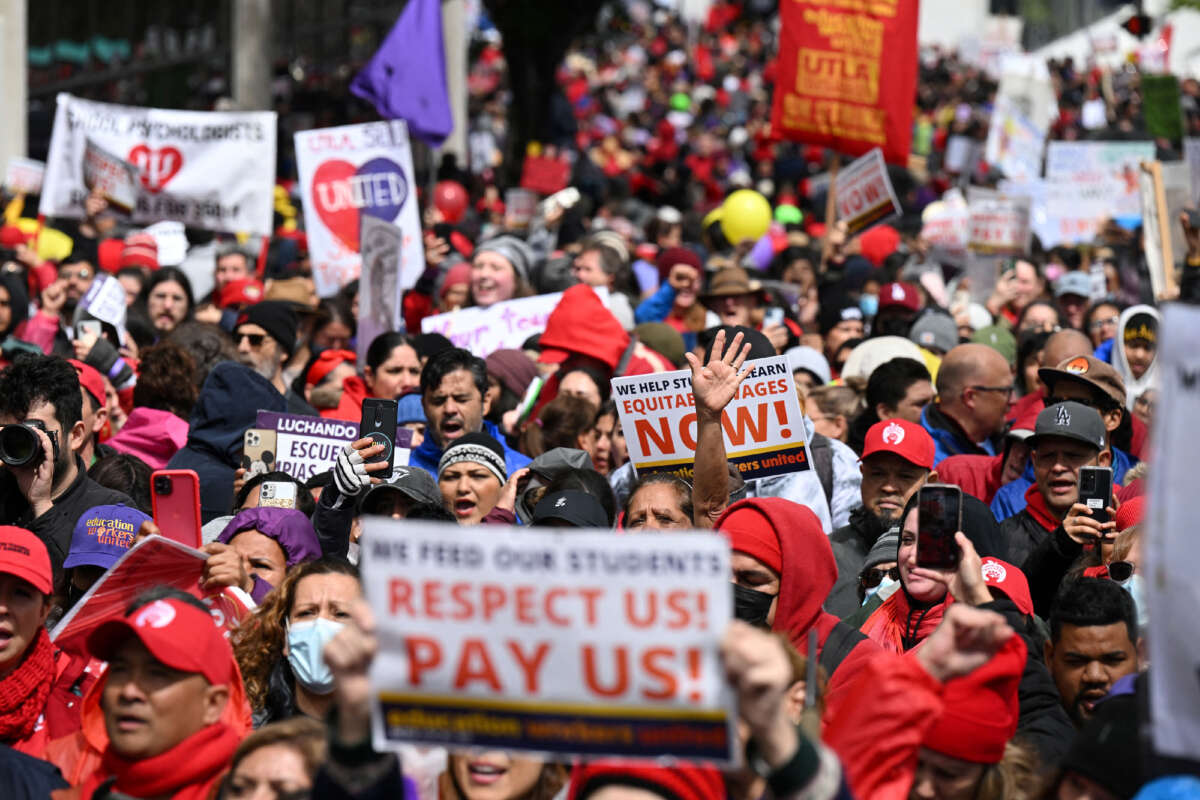New polling reveals that a majority of Americans recognize the growing crisis of low teacher pay and poor treatment despite a rabid and coordinated right wing quest to vilify and attack teachers across the country.
Last month, NPR/Ipsos surveyed two groups: 1,316 U.S. adults, and 510 U.S. grade school teachers. The poll found that nearly 7 in 10 Americans — 69 percent — say that public school teachers are not paid fairly. Eighty percent of K-12 teachers surveyed said the same. Only 22 percent of adults said that they believe teachers are paid fairly.
An even higher proportion of people believe that teachers are overworked. Among the general public, 75 percent said teachers are “asked to do too much work for the pay they receive.” A towering 93 percent of teachers agreed.
Teacher pay has indeed hit alarming lows. Research last year by the Economic Policy Institute (EPI) found that, in 2021, teachers’ average weekly pay was nearly 24 percent less than that of other college graduates, a phenomenon that EPI dubbed the “teacher pay penalty.” Moreover, this was the highest pay gap between teachers and other comparable college graduates on record since the 1970s.
Though the teacher pay penalty has been prominent for decades, a large part of the reason that it has risen so high is that public school teacher weekly pay increased by just $29 between 1996 and 2021, adjusted for inflation, the research found. By contrast, other college graduates’ weekly average pay increased by $445 over the same period — 15 times the teacher pay increase.
Due in part to chronic underfunding of public schools, the polling also found that the vast majority of K-12 public school teachers are not only devoting their personal time to helping students (77 percent), but also purchasing school supplies with their own money (86 percent). Both of these proportions rose since a similar poll was last conducted in 2018, when 69 percent of teachers reported working outside of work hours and 78 percent used their own money for supplies.
The polling lends credence to progressives’ calls for raising teacher salaries across the board. Earlier this year, Sen. Bernie Sanders (I-Vermont) introduced a bill that would set a national minimum wage of $60,000 a year for teachers, which would raise the salaries of 43 percent of public school teachers across the country.
“It is simply unacceptable that, in the richest country in the history of the world, many teachers are having to work two or three extra jobs just to make ends meet,” Sanders said at the time. Indeed, the NPR/Ipsos poll found that 35 percent of teachers report having to work a second job to make ends meet within the last year. Surprisingly, this is a decrease from 2018, when 42 percent of teachers said the same — though the discrepancy may be explained by the fact that teachers are leaving the occupation in droves, and perhaps the only people left who can afford to stay in the job are those with other forms of financial support.
Meanwhile, despite rampant attacks by right wing lawmakers and the dark money networks backing them, the overwhelming majority, 75 percent, of the public, including surveyed parents, trust public school teachers to make decisions in the classroom — moreso than they trusted their state governor or local school board to do the same.
Further, in spite of the false right wing narrative that public school teachers and educators are indoctrinating children by teaching children about race, the vast majority of respondents still believe that the subject should be taught. When asked, “To what extent do you support teaching about the history of slavery, racism, and segregation in public schools?” 79 percent of respondents said they strongly or somewhat support the idea.
When it comes to book bans, Republicans’ fascist goals for public education also fell short. The majority of the public – 65 percent, oppose school boards’ moves to ban books from schools and libraries, while 69 percent oppose state lawmakers’ efforts to do the same.
Join us in defending the truth before it’s too late
The future of independent journalism is uncertain, and the consequences of losing it are too grave to ignore. To ensure Truthout remains safe, strong, and free, we need to raise $43,000 in the next 6 days. Every dollar raised goes directly toward the costs of producing news you can trust.
Please give what you can — because by supporting us with a tax-deductible donation, you’re not just preserving a source of news, you’re helping to safeguard what’s left of our democracy.
